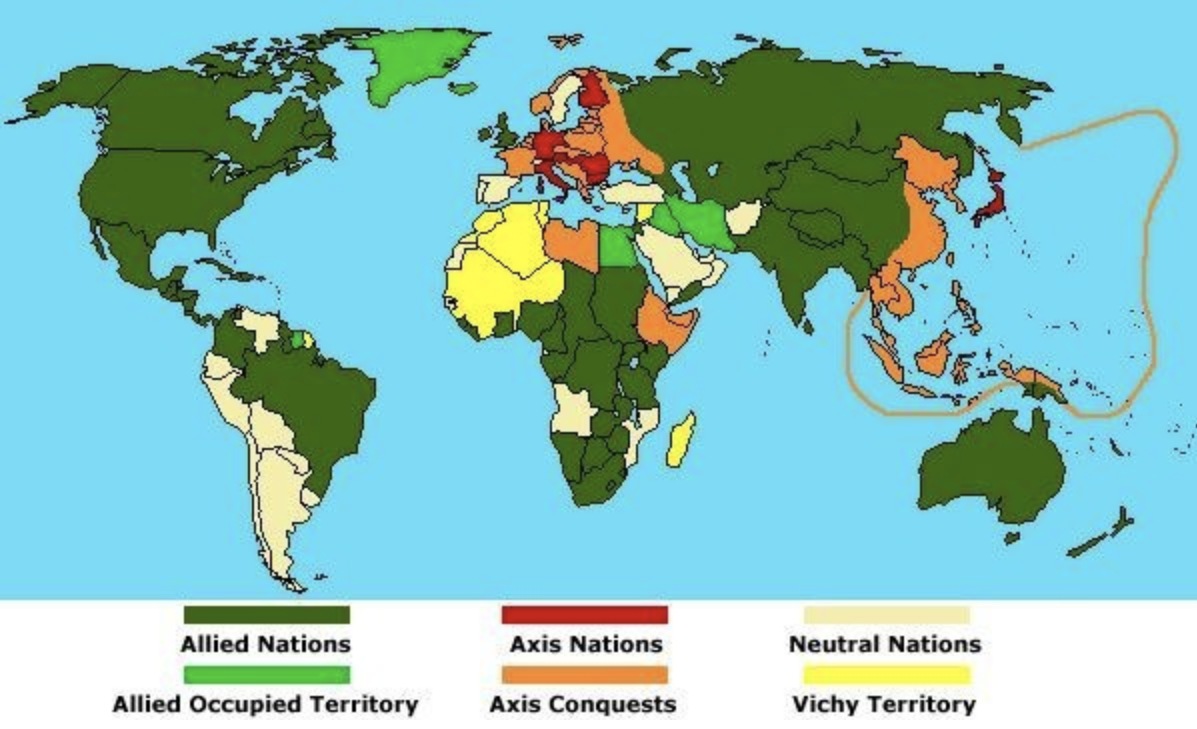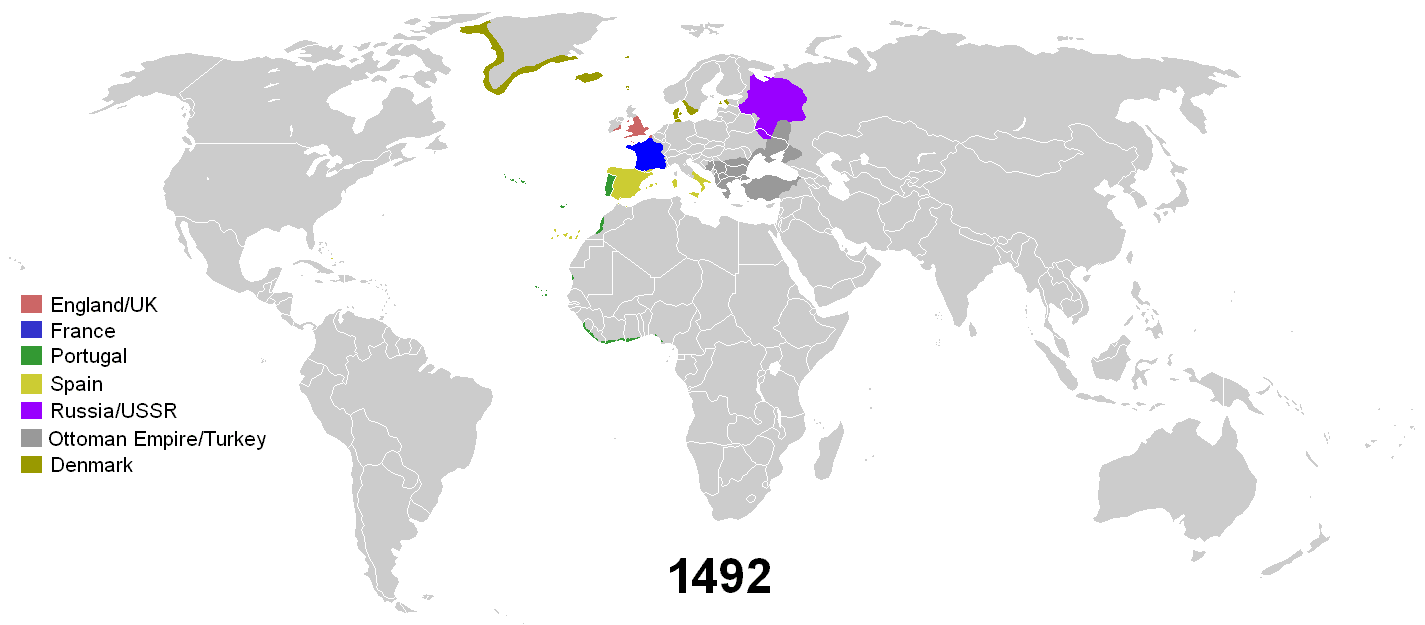Unit 8 Overview: Cold War & Decolonization
5 min read•january 13, 2023
K
Katie Moore
AP World History: Modern 🌍
577 resourcesSee Units
Unit 8 of AP World History covers two main topics in the post-war era: the Cold War and Decolonization. These two topics can be considered large-scale effects of the second world war in their impacts on global political balance and the lasting effects that the war had on the shifting global stage. This unit focuses intimately on how World War II pushed the world into a new era with new powers and trends that eventually led to the modern world. The Cold War began as a power struggle after the war, and the trend of decolonization kickstarted from the post-war independence movements in Africa and Asia.
Contextualizing Unit 8
To truly understand the historical context, look through the lens of the global conflicts during the first half of the twentieth century. As you probably already know, WWI can be attributed to growing nationalism in the warring countries, increased military power due to the Industrial Revolution, imperialism, and alliances. Unfortunately, the war was not successful in solving these rising disputes, and 21 years later, WWII broke out.
The failure of the Treaty of Versailles exacerbated these issues disputed in the first world war, enough to cause another. Economic losses in Germany led to the growth of Adolf Hitler as a fascist leader under the Nazi Party who used the Jews and Slavs as a scapegoat for Germany’s troubles. Hitler’s invasion of Poland in 1939 kicked off the beginning of World War II. Throughout the war, alliances fueled most of the fighting; Germany, Italy, and Japan formed the Axis Powers, and the United States (post-1941), France, Britain, and the Union of Soviet Socialist Republics (USSR), among others, formed the Allied Powers.

At the end of World War II, two major victors stood out: the United States and the USSR. While all Allies were considered victors, the USA and USSR were the only major allies to remain relatively undamaged compared to France and Britain, who had taken major damages.
The primary difference between these two nations was their economic systems. The United States was (and still is) a capitalist nation, whereas the USSR was a communist nation that formed following the Russian Revolution of 1918.
As the tensions of war came to a close, these two new superpowers found themselves in a power struggle for ultimate world domination (talk about drama). This power vacuum left after WWII is the primary cause of the Cold War. It is known as the Cold War because there was no direct fighting between the United States and Russia but rather espionage, hostility, and proxy wars.
Both of these wars resulted in a ton of death and destruction. However, many of the colonies established during colonization and imperialism started to think for themselves. Because of their involvement in the war, imperial holdings began to be challenged through negotiation and violence.
If you look at a world map in the current day, you’ll see that what once was the British, French, Germany, Belgian, and Italian Empires are now individual countries. This trend of decolonization begins following the Second World War and continues to this day.
Big Ideas in Unit 8
The Cold War
As we discussed earlier, the Cold War began as a conflict between the USA and USSR for world power, explicitly concerning the battle between capitalism and communism. Like most other conflicts, countries quickly banded together in the form of NATO and the Warsaw Pact.
Following World War II, Germany was split into two separate countries, East and West Germany, along with the city of Berlin. The Berlin Wall stood as one of the most glaring examples of Cold War tensions. Despite a lack of direct fighting, the USA and USSR did fight in proxy wars such as the Korean War and the Vietnam War. These wars stood as symbolic acts of aggression between capitalist and communist forces.
The Cold War also encouraged indirect hostility such as espionage and vague threats. However, the constant threat of mutually assured destruction led neither country to use nuclear weapons against each other. You’ll also learn about the ideological tensions of the Cold War, such as the space race, which pitted the USSR and USA against each other on intellectual and nationalist grounds as well as technological grounds.
Decolonization
World War II also led to an era of decolonization. Due to their involvement in World War II, many colonies began fighting for their independence from their colonial holders. There are two distinct categories of decolonization, though many countries had both instances: negotiated independence and violent independence. Negotiated independence occurred in places like India, where they earned their independence through legal means, such as petitioning the British government or hosting boycotts and marches such as those run by Mahatma Gandhi.
Violent independence is just as it sounds - violent. These usually involve war, and examples include the decolonization of Vietnam and Algeria. There will also be new independent states that form, such as Bangladesh, Pakistan, and Israel, that will lead to conflict.

Main Events
1914-1918: World War I
1918-1920: Estonian war for independence
1919: Gandhi’s first satyagraha; Egyptian Revolution; Syrian National Congress convenes
1919: May 4th Movement
1929: Great Depression begins
1929-1947: Indian protest for independence
1931-32: Japanese invasion of Manchuria
1933: Great Depression ends
1939: World War II starts
1945: World War II ends/Yalta and Potsdam conferences
1947: Marshall Plan
1948: Israel created
1949: NATO formed//China established as a communist country
1950-53: Korean War
1955: Bandung Conference
1957: Ghanaian independence
1959-1975: Vietnam War
1960: Year of Africa (independence of 17 African nations, such as Nigeria and Cameroon)
1962: Cuban Missile Crisis
1963: Kenyan independence
1974-1990: Pinochet in Chile
1975-2002: Angolan Civil War
1989: Year of independence of many countries from the Soviet bloc/collapse of the Berlin Wall
Discussion Questions:
- How did the results of WWII lead to the Cold War and decolonization?
- What were the long- and short-term causes of the Cold War?
- What factors led to the different organizations of new states and how?
- How was the Cold War similar in the Western and Eastern Hemispheres? How was it different?
🎥Watch: Crash Course - Cold War
🎥Watch: Crash Course - Decolonization
📝Read: Freemanpedia - Notes
📝Read: Freemanpedia - Cold War
📝Read: Freemanpedia - Decolonization
✍️Practice: LEQ #3 - Continuity and Change after 1900
✍️Practice: FRQ #1 - Totalitarian vs. democratic states and violence
✍️Practice: LEQ #4 - Political ideologies challenging traditional order
✍️Practice: LEQ #4 - State involvement in the economy
💭Review: Quizlet - Cold War
💭Review: Quizlet - Cold War (a little deeper)
💭Review: Quizlet - Communism/Decolonization
💭Review: Quizlet - Cold War/Decolonization
💭Review: Quizlet - Decolonization
Review with Friends
After studying on your own, invite some friends to a study with me online session to discuss the main points of the lesson and review anything that you may be confused on. It is a great way for everyone to have some efficient study time!
Browse Study Guides By Unit
🐎Unit 1 – The Global Tapestry, 1200-1450
🐫Unit 2 – Networks of Exchange, 1200-1450
🕌Unit 3 – Land-Based Empires, 1450-1750
🍕Unit 4 – Transoceanic Interactions, 1450-1750
✊🏽Unit 5 – Revolutions, 1750-1900
🚂Unit 6 – Consequences of Industrialization, 1750-1900
💣Unit 7 – Global Conflict, 1900-Present
🥶Unit 8 – Cold War & Decolonization, 1900-Present
✈️Unit 9 – Globalization, 1900-Present
✏️Frequently Asked Questions
🚀Thematic Guides
🗺Regional Guides
🤓Historical Thinking Skills
🧐 Multiple Choice Questions (MCQ)
📋Short Answer Questions (SAQ)
📝Long Essay Questions (LEQ)
📑Document Based Questions (DBQ)

Fiveable
Resources
© 2023 Fiveable Inc. All rights reserved.